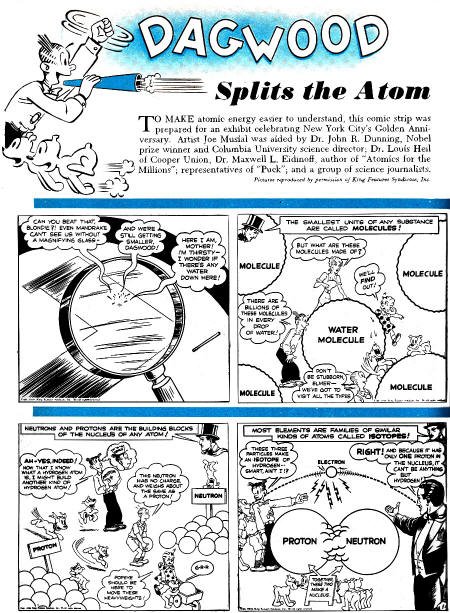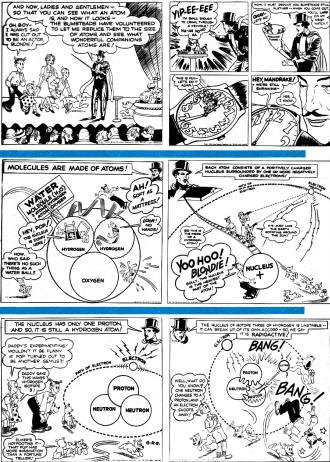|
September 1948 Popular Science
 [Table of Contents] [Table of Contents]
Wax nostalgic about and learn from the history of early
electronics. See articles from
Popular
Science, published 1872-2021. All copyrights hereby acknowledged.
|
I suppose if the U.S.
Army can resort to comic books to train troops on
preventative maintenance and proper care and feeding of an
M16, Popular Science
magazine can use comics to teach about the bombs which had recently finally
brought an end to World War II. In this 1948 issue, the Bumstead family and
Mandrake the Magician take on the task of putting the language of nuclear
physics into terms understandable by the layman. Back in the day, the
Blondie (began
in 1930 by Chic Young) and
Mandrake the
Magician (began in 1934 by Lee Falk) comic strips were among the most
popular. I have read Blondie since childhood (born 1958). BTW, did you know
Blondie's maiden name is
Boopadoop?
...but I digress. In this adventure, Mandrake shrinks the Bumsteads (Dagwood,
Blondie, Alexander, Cookie, and even pooch Daisy) down to atomic size so they
can directly witness the goings on within the nucleus. Although the
quantum mechanical
model of the atom had been adopted by 1948, the
Bohr planetary version is
implied, likely because most people had never heard of the quantum model. Enjoy.
Dagwood Splits the Atom
 To make atomic energy easier to understand, this comic strip was prepared for
an exhibit celebrating New York City's Golden Anniversary. Artist Joe Musial was
aided by Dr. John R. Dunning, Nobel prize winner and Columbia University science
director; Dr. Louis Heil of Cooper Union; Dr. Maxwell L. Eidinoff, author of Atomics
for the Millions"; representatives of "Puck"; and a group of science journalists. To make atomic energy easier to understand, this comic strip was prepared for
an exhibit celebrating New York City's Golden Anniversary. Artist Joe Musial was
aided by Dr. John R. Dunning, Nobel prize winner and Columbia University science
director; Dr. Louis Heil of Cooper Union; Dr. Maxwell L. Eidinoff, author of Atomics
for the Millions"; representatives of "Puck"; and a group of science journalists.
Pictures reproduced by permission of King Features Syndicate, Inc.
 
|











